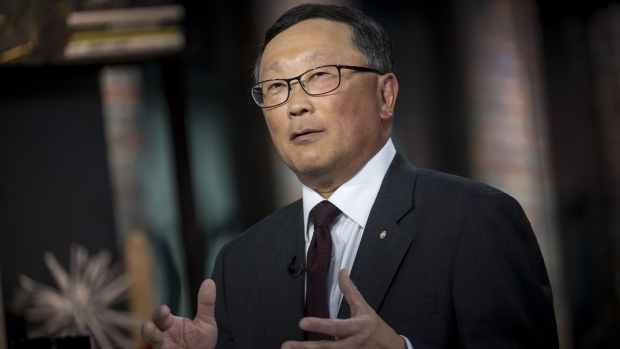Jun 15, 2018
Chen gains believers, but BlackBerry comeback needs 'grand slams': Analysts

When John Chen took over as BlackBerry Ltd.’s chief executive in November 2013, he compared himself to an emergency room doctor tasked with stopping the company’s bleeding as he aimed to shift the technology company away from making its iconic smartphones toward the higher-margin software business.
It took a few years – but BlackBerry’s turnaround appears to be complete and investors are finally taking notice.
The Waterloo, Ont.-based company’s shares are up about 14 per cent over the past year on the New York Stock Exchange, but off the peak in January when it announced a partnership China’s Baidu Inc. on autonomous vehicle technology. Since Chen took over in 2013, BlackBerry’s stock has nearly doubled.
BlackBerry’s market performance – as well as Chen’s ability to stickhandle the company back to profitability – earned him a pricey five-year contract extension in March that could net the chief executive more than $300 million if all of his performance-based awards vest.
“What [Chen] has done at BlackBerry so far is transform the company to a software-as-a-service that’s transformed their margin structure,” said Mike Genovese, managing director of MKM Partners, in an interview with BNN Bloomberg. “He deserves a lot of credit for that.”
Despite its name once being synonymous with the cell phone, BlackBerry is no longer the smartphone giant it once was. Today, it’s main business lies in managing cybersecurity software for phones, information technology systems and increasingly, the transportation sector. Chen describes BlackBerry as a “fundamental” company within the so-called “internet-of-things” market, a segment of the technology sector where everyday objects – from refrigerators and power grid generators to driverless cars – are all connected to the web and will ultimately need protection from hackers.
Investors and analysts alike will be looking for further clarity on BlackBerry’s long-term plans to become a major player in the automotive market at the company’s annual general meeting Wednesday, in addition to its fiscal first quarter 2019 results on Friday. BlackBerry hasn’t provided full revenue guidance for the quarter but Chen forecast the company will report double-digit billings growth, positive free cash flow and will remain profitable in its fiscal first quarter in March.
“We’ll be a major player in that space in five years,” Chen told BNN Bloomberg in a March 28 interview. “In ‘internet-of-things’, we should be a very fundamental, foundation player.”
Chen’s ability to change investors’ perceptions that BlackBerry no longer makes phones but rather security software makes the stock more of a “call option” for investors, Genovese said. “You’re buying BlackBerry because of the potential that there’s some business that’s small today and could become a multi-billion dollar business in the future.”
For BlackBerry to regain its former status as a $50 billion company again, Genovese said that “they would have to be hitting not just home runs but grand slams in three to four different things that are very small today.”
The transportation business is expected to be a big driver of BlackBerry’s future revenue growth, according to RBC Capital Market analyst Paul Treiber, in a recent report. Treiber said BlackBerry expects its revenue in its “Technology Services” group, which includes its QNX automotive business as well as its Radar devices for trucking companies, to rise as much as five times to about $815 million over the next three to five years.
That’s based on BlackBerry generating as much as $20 a vehicle that licenses its QNX operating system and multiple applications installed. BlackBerry says it currently receives about $1 to $3 for providing software for a car’s infotainment system, of which it has been installed in about 100 million cars.
But Treiber noted BlackBerry needs to provide more clarity on the performance of its traditional cybersecurity business if it wants to continue to impress the market.
“We believe core software revenue growth needs to accelerate or visibility needs to improve in order to justify further upside for the stock,” Treiber said.






